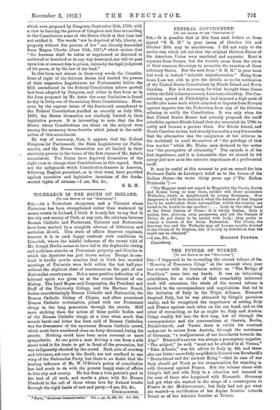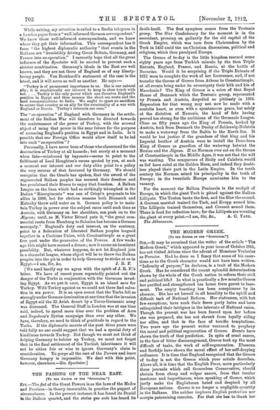!lib FUTURE OF TURKEY.
[To THE EDITOR OP THE " SPECTATOR.1
Stn,—I happened to be re-reading the second volume of the "Memoirs of Francesco Crispi " at the moment when your last number with its luminous article on " The Bridge of Peschiera" came into my hands. It was an interesting coincidence, for as readers of that remarkably indiscreet work will remember, the whole of the second volume is devoted to the correspondence and negotiations that led to the inclusion of Italy in the Triple Alliance. Bismarck despised Italy, but he was attracted by Crispi's garrulous vanity, and he recognized the importance of setting Italy and France against each other on the one hand, and on the other of reconciling, so far as might be, Italy and Austria. Crispi readily fell into the first trap, but all through the correspondence and the conversations at Gastein, Berlin, Friedrichsruh, and Varzin there is visible his constant endeavour to secure from Austria, through the assistance of Germany, "a readjustment of our boundaries towards the Alps." Bismarck's answer was always a peremptory negative. "The subject," he said, "must not be alluded to at Vienna." "Take Albania," was his advice to Italy (p. 44), and there also are hints—more fully amplified in General von Bernhardi's " Deutschland and der niichste Krieg "—that in case of war Italy should get Tunis as her compensation for standing in with Germany against France. But the volume closes with Crispi's fall and with Italy in a situation not unusual in the case of those who bargained with Bismarck. Germany had got what she wanted in the shape of a counterpoise to France in the Mediterranean ; but Italy had not got what she wanted—a rectification of her Alpine frontier towards Trient or of her Adriatic frontier at Trieste.
While writing, my attention is called to a Berlin telegram in a London paper from a " well. informed German correspondent." We know those well-informed correspondents, and we know where they get their information. This correspondent has it from " the highest diplomatic authority " that events in the Balkans are "irresistibly driving Great Britain, Germany, and
France into co-operation." I earnestly hope that all the great influence of the Spectator will be exerted to prevent such a
sinister combination. Germany's ideals in the East are well known, and they are not those of England or of any liberty- loving people. Von Bernhardi's statement of the case is the latest, and it will serve as well as another. He says :—
" Turkey is of paramount importance to us. She is our natural ally; it is emphatically our interest to keep in close touch with her. . . . Turkey is the only power which can threaten England's position in Egypt and thus menace the short sea route and the land communications to India. We ought to spare no sacrifices to secure that country as an ally for the eventuality of a war with England or Russia. Turkey's interests are ours."
The " co-operation " of England with Germany in the settle- ment of the Balkan War will therefore be directed towards the maintenance of the power of Turkey, with the avowed
object of using that power in the near future for the purpose of menacing England's position in Egypt and in India. Is it possible that our Foreign Office would allow itself to be led into such " co-operation " ?
Personally, I have never been of those who clamoured for the destruction of Turkey at all hazards; but surely at a moment when fate—reinforced by bayonets—seems to point to the fulfilment of Lord Houghton's verses quoted by you, at such a moment our interest and our duty alike point to a policy
the very reverse of that favoured by Germany. We should recognize that the Oracle has spoken, that the sword of the regenerated Balkan peoples has secured their freedom and has proclaimed their fitness to enjoy that freedom. A Balkan League on the lines which had so strikingly triumphed in the Italian " Riaorgimento" was one of Crispi's proposals to his allies in 1889, but for obvious reasons both Bismarck and Kalnoky threw cold water on it. German policy is to main- tain Turkey in power over the subject races until such time as Austria, with Germany on her shoulders, can push on to the
.gear; until, as M. Victor B6rard puts it, "the great com- mercial route from Hamburg to Salonica has become a German monopoly." England's duty and interest, on the contrary, point to a federation of liberated Balkan peoples leagued together in a Customs Union, with Constantinople as a great free port under the guarantee of the Powers. A few weeks ago this might have seemed a dream; now it seems an imminent possibility. Bat, whatever happens, do not let England join in a shameful league, whose object will be to throw the Balkan peoples into the pit in order to help Germany to strike at us in
[We need hardly say we agree with the spirit of J. R. F.'s letter. We have of recent years repeatedly pointed out the danger of the Turks in conjunction with the Germans invad- ing Egypt. As we put it once, Egypt is an island save for Turkey. With Turkey against us we could not there find salva- tion in sea power. It is an open secret that the Turks fell so strongly under German domination at one time that the invasion of Egypt Ira the El Ariah desert by a Turco-Germanic army was discussed. The General Staff in London was at one time said, indeed, to spend more time over the problem of Acre and Napoleon's Syrian campaign than over any other. We have, therefore, no need to think of gratitude in regard to the Turks. If the diplomatic secrets of the past three years were told fully no one could suggest that we had a special duty of kindliness towards Turkey. But though we must not think of helping Germany to bolster up Turkey, we must not forget that in the final settlement of the Turkish inheritance it will not be either fair or wise to ignore Germany's claim to consideration. To gorge all the rest of the Powers and leave Germany hungry is impossible. We deal with this point, however, elsewhere.—En. Spectator.]



























































 Previous page
Previous page